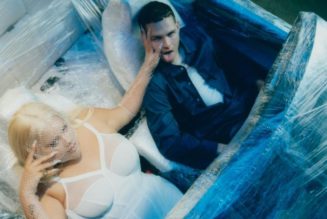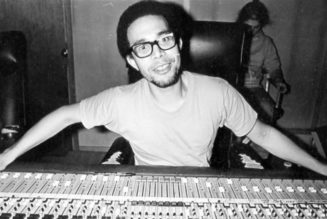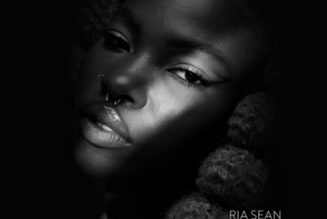
Even those who were familiar with the artistry of Mexican singer/songwriter Natalia Lafourcade were stunned by De Todas las Flores, her tenth studio album. Her first collection of original material in seven years, it is also her most vulnerable and sophisticated work to date. Her voice has such an immediacy that almost leaps off the speakers.
Lafourcade is only 39, but she sounds like an old soul on these delicately arranged songs informed by Latin formats like bossa nova, bolero and trova. The shades of composer Claude Debussy in the intro of the folk ballad “Llévame Viento” are no coincidence — her album is a neo-impressionist masterpiece, the best effort of her career, and a fitting nominee in the Best Latin Rock or Alternative Album Category at the 2024 GRAMMYs.
“I would never have imagined my album being nominated in this category. But then I think about the idiosyncrasies of rock — a style spawned from broken places, the crevice where a flower can blossom — and it makes sense,” Lafourade told GRAMMY.com in a roundtable discussion with her fellow 2024 nominees.
Recorded live to tape without any previous rehearsals together with a select group of virtuoso, jazz-oriented musicians — including Marc Ribot on guitar — the collection has an austere beauty to it, favoring a purity of sound and stately elegance that has been mostly absent from Latin music during the past decade. No visitors were allowed during the 12 days of sessions to preserve the intimacy of the process.
Helmed by acclaimed producer Adan Jodorowsky, De Todas las Flores was mixed in Paris — a trip that allowed the singer the opportunity to visit the legendary flower garden by painter Claude Monet. “This album saved me,” Lafourcade says. “It reminded me to be responsible for my own garden, my self-care. Its message is not only directed at me, but to other people as well.”
Lafourcade’s commitment to her art and her fastidious attention to detail were rewarded at the 2023 Latin GRAMMYs. On the Sevilla stage, she won golden gramophones Record Of The Year, Best Singer/Songwriter Album and Best Singer/Songwriter Song Categories.
Ahead of the 66th GRAMMY Awards, the singer discussed her recent tour, her recording process, and the album’s common points with a Cuban classic from decades past.
One of the best things that happened to me last year was seeing you in concert during your U.S. tour. I was especially impressed by the gigantic costume that you begin the show with — the larger-than-life skirt.
Ah, yes, the skirt. [Laughs.] It all began at the photo shoot for the new album. The photographer asked me to wear a huge skirt because she liked the texture, like taffeta. I loved the end result and asked my stage designers for a skirt of many meters in diameter. Something truly huge that would allow me to transform myself. It could be like a boulder, or the endless sea, or a shadow that I carried along with me.
I wanted something absurdly elegant, the kind of ritualistic getup that you may wear at a wedding or a lavish evening reception. I was getting ready to present the album at Carnegie Hall, and I imagined myself walking onstage in the darkness — the skirt would be the protagonist.
You leave the big skirt behind after the first half of the show. I imagined there was a deeper meaning to that.
The skirt represents the darkness and emptiness that you feel when there your soul breaks down. It’s like a dark canvass that allows you the option of painting it with light, thus finding life again. The skirt pins me down during the first half of the show, but then I lose it, much like an animal sheds its skin.
All that death — the shadows, the tears, the emptiness — I offer it to the light as a gift, with the understanding that darkness can also be the greatest teacher. The moment where I took off the skirt became very moving to me, like psychomagic. Getting rid of that unwanted weight — but at the same honoring it with gratitude.
2024 GRAMMYs: Explore More & Meet The Nominees
Just like the skirt, De Todas las Flores is a larger-than-life record. I believe it will be treasured by fans for many decades. In a way, it’s the kind of album that transcends us all. Do you feel the same?
I feel completely overtaken by this record. It’s the kind of rare album that appears once in a while. It forced me to become exceedingly humble, honest and patient with myself. My task was to deliver these songs, and let them do their thing with the people who listen and absorb them.
I am grateful that it is recognized and nominated, but it goes beyond any marketing strategy or accounting.
Something that strikes me about the album is the almost supernatural immediacy of your voice. It sounds like you’re right here singing those tunes. How is that effect achieved?
I think you’re referring to the magic of an energy that I could not really explain with words. It’s like a physical sensation about something that arrives from a different place. It’s not in me — it’s just passing through my being.
I’ve never considered myself a virtuoso singer. When we were making the album, I tried to remove myself from the equation. I was vocalizing with the least possible effort, simply surrendering to the songs, allowing them to express what they wanted to say. It felt warm and comforting.
What about the actual recording process?
There were different elements that played a part in creating that feeling: the fact that we were playing together in the same room, without a click track, reverb or autotune of any kind.
The element of surprise played a big part, because we didn’t really know where the music was taking us. We relied largely on improvisation. We felt it was important to respect the natural qualities of my voice, the instruments, even the echo in the room. I knew that it would add a special quality to the album, and make it sound like you describe it.
I remember the indelible moment of listening to Casa for the first time in 2005. A young girl singing bossa novas about ducklings and sunny love songs about baking a cake for her beau…
So innocent, right? [Laughs.]
The vibe of that record was incredibly light and frothy. In contrast, De Todas las Flores has this beautiful, ever-present gravity. How did you become the singer you are today?
My music has always involved a transference of my soul and personality in the present moment. In the period of time that elapsed between both albums, at one point I broke down. It happens to all of us. The dance of life gives us moments of flight, and moments of crashing down — I see both as treasures.
My life has been marked by changes. The register of my voice is different; I can’t sing a number of melodies the way I used to. The road taken has given me experience, and you find different shades as you go through life. I’ve learned not to run away from the dark moments, but rather take from them something that can enrich my art.
That said, a song like “Canta la Arena” [from De Todas las Flores] is related to the bossa novas of my youth. It’s about finding life and joy at a beach in Veracruz. There are elements that pull me out of the shadows, and I interpret them through my current point of view. The only way to reinvent yourself is to live intensely, to search and explore. De Todas las Flores is about doing that. A song like ““Pajarito Colibrí” is about liberating your soul from a place of mourning.
I may be completely off, but the acoustic vibe and wide-open spaces remind me of the first Buena Vista Social Club album…
What a spectacular reference. We definitely had in mind albums like Buena Vista, Kind of Blue, Coltrane’s A Love Supreme, and some Nina Simone records. They all reflect the same search – our album is Latin in the point of view, but reflected through the prism of jazz. A group of musicians playing together in the same room, with audible mistakes. We played together, reading each other, finding the rhythm of the moment in an organic way. Just like the Buena Vista Social Club did.
That album happened by mistake, of course. It was meant as a conclave of African musicians playing in Cuba, but when they didn’t show up, Ry Cooder assembled an improvised group of local veterans.
At one point in the recording, Marc Ribot commented that real music happens within a short span of time. It’s a very intense moment of togetherness, and somebody must be there and press the record button.
So many coincidences need to happen at the same time for the magic to take place. I’m always praying for that moment, because when it happens, I feel truly alive.









